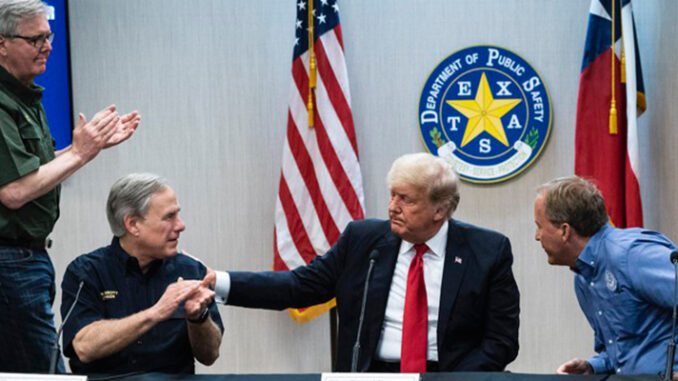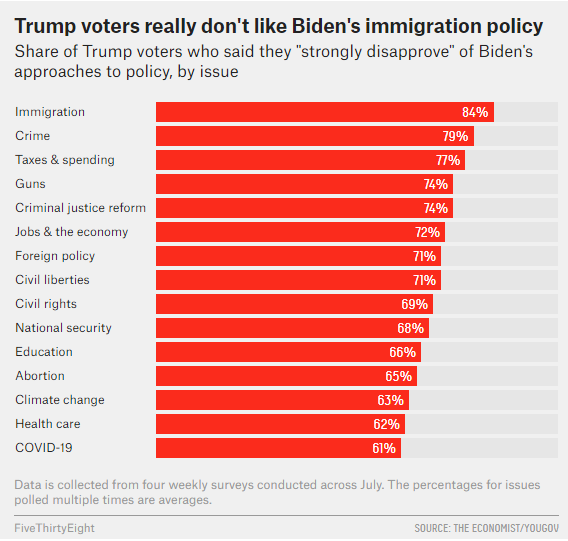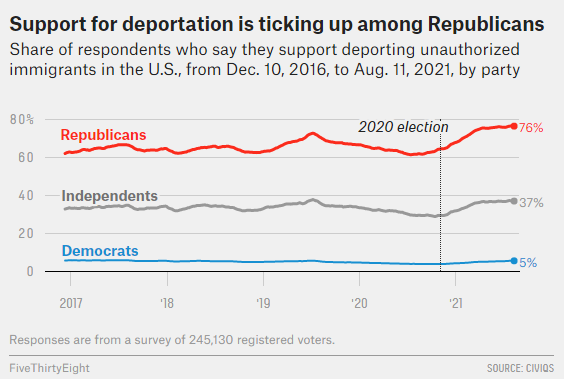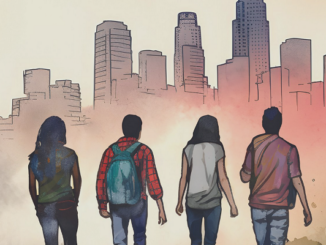
Republicans don’t just disapprove of the job Biden is doing on immigration, Republicans have grown less willing to support a path to citizenship for unauthorized immigrants in the U.S.
by Michael Tesler
In early August, President Biden took aim at Republican governors like Ron DeSantis of Florida and Greg Abbott of Texas for not taking enough precautions to counter the surge in COVID-19 cases in their states.
But DeSantis was quick to pin the blame on Biden instead, writing the following in a fundraising email to supporters: “Joe Biden has the nerve to tell me to get out of the way on COVID while he lets COVID-infected migrants pour over our southern border by the hundreds of thousands. No elected official is doing more to enable the transmission of COVID in America than Joe Biden with his open borders policies.”
Only what DeSantis is claiming isn’t borne out by data. Rather, according to public health experts, the far more likely culprit for the surge in Florida’s cases is the state’s low vaccination rates.
DeSantis’s decision to scapegoat immigrants for the record number of coronavirus cases is important, though, as it speaks to a larger strategy within the GOP: attack Biden’s immigration policies at every conceivable turn. Prominent Republicans, including former President Donald Trump and Sens. Ted Cruz and Lindsey Graham, not to mention dozens of other GOP lawmakers, have been vocal in their criticism of how the Biden administration has handled immigration. Conservative cable news channel Fox News has also doubled down on its immigration coverage since Biden’s inauguration, mentioning “immigration,” “immigrant” or the “border” more than 39,000 times compared with fewer than 7,000 and 9,000 mentions on CNN and MSNBC, respectively.1
This strategy reflects just how much immigration has become a key issue for Republicans. What’s more, with a Democrat in the White House, Republicans are now more likely to be motivated by immigration, marking a shift in how much issues of race and ethnicity can motivate voters when their party is out of office.
Take how strongly Trump supporters currently disapprove of Biden’s performance on immigration. Two Economist/YouGov polls conducted in July found that 84 percent of Trump voters “strongly disapproved” of how the president was handling immigration. That’s the highest level of disapproval of any of the 15 issues The Economist/YouGov asked about in its four weekly surveys in July.

Republicans don’t just disapprove of the job Biden is doing on immigration, though. Data from Civiqs’s daily tracking polls shows that Republicans — and to a lesser extent independents — have grown less willing to support a path to citizenship for unauthorized immigrants in the U.S. Since Election Day 2020, Republicans’ support for deporting unauthorized immigrants has increased by 12 percentage points while independents’ support has ticked up 8 points. It’s because of these increases that overall support for deportations is the highest it’s been since Civiqs first asked the question in December 2016.

Civiqs isn’t the only pollster to document this trend either. Polling from the Pew Research Center has also found that the share of Republicans who oppose finding a legal way for unauthorized immigrants to stay in the U.S. increased by 9 points between June 2020 and April 2021. And Reuters/Ipsos pointed to an even sharper uptick — an 18-point increase in the share of Republicans who opposed a path to citizenship for unauthorized immigrants — from 2018 to February 2021. Overall, Republicans are just a lot more likely to say illegal immigration poses a very serious problem, up from 43 percent in 2020 to 72 percent in April.
On the one hand, this trend fits within a familiar pattern in political science research arguing that public opinion often operates as a thermostat, whereby the public shifts against the current president’s positions to prevent policy-making from becoming too liberal or too conservative. On immigration, for instance, Americans’ opinions moved sharply to the left in response to Trump’s restrictive rhetoric and policies — this was the case especially among Democrats. Just as with a thermostat, though, public opinion is now reacting to the warmer environment on immigration under Biden by growing cooler toward it.
These recent pendulum swings on immigration, however, mark a potentially noteworthy departure. Thermostatic trends in Americans’ views about race and ethnicity have historically been weaker than Americans’ reactions to presidents’ economic policies. But that was before immigration became such a deep dividing line between Democrats and Republicans. Now, with the two parties pushing harder in opposite directions on immigration than they have in the recent past, immigration has emerged as an important political issue with significant policy consequences.
Indeed, the Trump administration was frequently criticized for its strict immigration policies, like separating children from their migrant parents, banning travel from predominantly Muslim countries and limiting protections for unauthorized immigrants brought to the country as children, which pushed Democrats further to the left on immigration. Likewise, the criticism that the Biden administration is not doing enough to secure the U.S.-Mexico border with the number of migrants crossing the border at a two-decade high is pushing Republicans further to the right on immigration. That growing hostility is likely to be a motivating factor in Republican politics throughout Biden’s presidency. From the earliest days of Trump’s presidential campaign, anti-immigrant sentiments fueled his rise to the top of the Republican Party. They also helped move some of then-President Barack Obama’s 2012 supporters to vote for Trump in the 2016 general election. Republicans’ rising concerns about Trump’s signature policy issue of immigration should, therefore, only solidify his stranglehold on the GOP in the Biden era.
.
Michael Tesler is a professor of political science at University of California, Irvine, author of “Post-Racial or Most-Racial? Race and Politics in the Obama Era” and co-author of “Identity Crisis: The 2016 Presidential Campaign and the Battle for the Meaning of America.”



